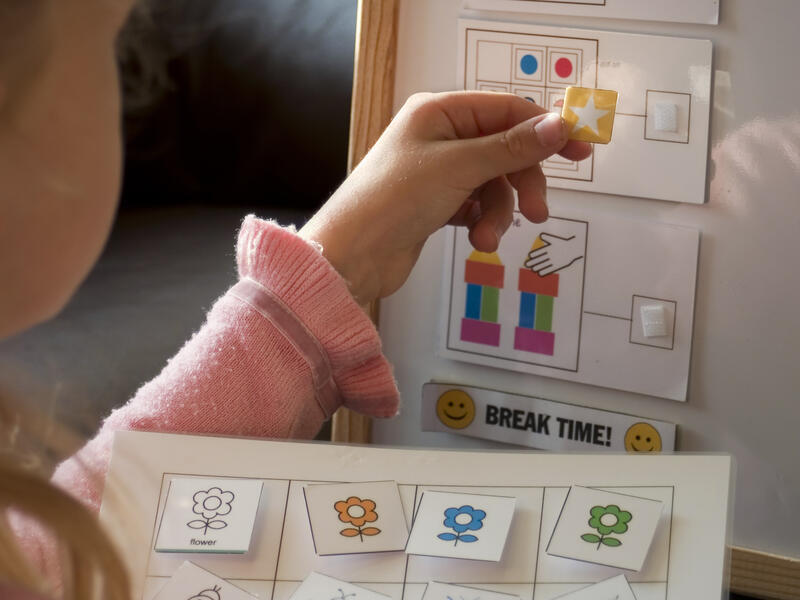Identifying autism or autism spectrum disorders (ASD) when children are still toddlers encourages earlier intervention, which can have a positive impact on a child’s development. Research has determined that certain early signs of autism are evident by 14 months of age and may be confirmed by the time a child is 3. Until recently, autism or ASD, which encompasses autism and several related disorders, was rarely diagnosed this early in a child’s development.
Parents who suspect their toddler may have some developmental issues should talk to a pediatrician about their concerns. Child development experts and research in autism support treating a child as soon as a diagnosis is made. While there is no cure, intervening early with behavior modification, skills training and developmental therapies can help toddlers function better now as well as in the future.
What are some behaviors that might alert me to the possibility of autism or ASD?
- Your toddler doesn’t appear interested in other children.
- Your toddler often doesn’t respond when their name is called.
- Your toddler doesn’t meet or follow your gaze and is unlikely to look at something like a toy you point to across the room.
- Your toddler is unlikely to show or point to something of interest.
- Your child doesn’t imitate simple gestures or sounds.
- Your child doesn’t use a toy as it is intended. For instance, if your toddler is playing with a toy airplane, they don’t make motions simulating flying the plane. Or if they are using plastic kitchen toys, there is no association with using them to pretend to eat something. There may instead be repetitive actions such as banging the toy, focusing on a small part of the toy, or arranging toys in certain ways and resisting having them moved, even playfully.
- Your toddler doesn’t look or ask for help but consistently struggles alone when trying to accomplish something.
- Your toddler has a small number of sounds, words and gestures to communicate compared to other toddlers of similar age.
- Your toddler responds to limited interactions with you. For instance, they may react positively and repeatedly to a particular toy but have no reaction when you present other toys or try to engage them in play.
If your child shows some of these behaviors, it does not necessarily mean that they have ASD. However, these are important things to bring up with your child’s health care provider, who can identify whether or not more evaluation is needed.
What do I need to know if my child does have autism?
First of all, you are not alone. About 1 in 59 children has been diagnosed with autism or ASD. These complex disabilities affect development of your child’s behavior, social and communication skills. Great strides have been made in treatment, and the primary goal is to improve your toddler’s ability to function well.
Learn all you can about your child’s disorder. Symptoms and behaviors change with age, as well as treatment strategies. So it’s important to stay informed and take advantage of resources available to your child.
You should also learn all you can about your child’s needs. Communication between you and your child’s treatment/education team will be essential. Also, keep in mind that your child’s needs and strengths will change with age, so treatment and management strategies will need to change over time, too. Two-way communication between family and treatment team is essential to make sure your child’s changing needs and strengths are addressed in their care.
Develop a social network. Talk to other professionals and parents who have children with autism. Plan outings with other families and children with autism. Look for local groups that can help you with these connections. Parenting a child with autism is stressful and challenging. You need to develop a network of people who can support you. You also need to plan times for you and your partner to take breaks to keep your relationship strong. You each also need individual breaks to maintain personal emotional health.
Educate your extended family on autism so they can support you and your toddler. If you have other children, they may feel frustrated that this child receives more attention or seems to not have the same consequences for problem behaviors. Engage family members’ help in assisting you with the needs of your autistic child and other children in your family.
Learn about behavioral and skills training, which will help your toddler learn to communicate better. Autism affects children differently. A high-functioning toddler may be able to handle daycare and group situations fairly well while a lower-functioning toddler may need a small, highly structured environment to do well. As you work with your child to help them develop certain skills and modify behavior appropriately, your child’s responses to these types of situations is likely to also improve.
Be cautious about using home treatments you find on websites, in the media or hear about from other people. Before you try something you may have heard works wonderfully with children with autism, talk to your health care team first.
Raising a child on the autism spectrum requires teamwork. Develop a team of health care and education professionals to help care for your child and who will give you support.
Learn more
- Autism and ADHD: How to know if your child should be tested
- Vaccines and autism: Separating the facts from the fiction
- Sanford Health Plan to offer ABA coverage in 2020
…
Posted In Behavioral Health, Children's, Health Information, Inclusion at Sanford, Parenting
